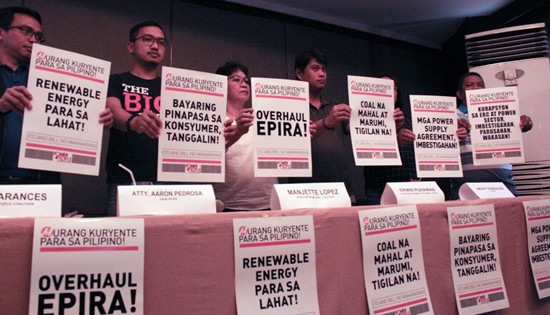Murang kuryente: Posible?
Groups oppose
using of Malampaya funds to cover NAPOCOR debts

Consumers, CSOs urge legislators to address true
cause of costly energy in the Philippines
Press Release
January 25, 2018
QUEZON CITY – A
coalition of civil society organizations, coal-affected communities,
and power consumers finds current pending legislative proposals
insufficient to reduce the high cost of electricity.
The Power for People (P4P)
Coalition in a press conference today warned that energy reforms are
not enough "without overhauling the Electric and Power Industry
Reform Act, the complete removal of pass-on provisions, expanding
subsidies for impoverished consumers, rejecting the entrance of more
coal in the energy mix, and combating corruption in the ERC."
"While we are glad that
the problem of costly energy is front and center in the chambers of
Congress, it will only continue to be felt by consumers if
fundamental changes are not introduced and made into law," said P4P
convenor and Center for Energy, Ecology, and Development (CEED)
Executive Director Gerry Arances.
The Coalition zeroed in on
the Murang Kuryente Bill which aims to use the Malampaya fund to
cover the stranded debts and contract costs incurred by the National
Power Corporation.
"Filipino consumers should
not be paying for these stranded debts and costly contracts in the
first place," said Arances. "The Malampaya fund could be more
properly put to use in order to benefit ordinary end-users directly,
like in expanding the coverage and increasing subsidies for
households which use small amounts of electricity through the
lifeline rates," Arances claimed.
"To put things in
perspective, the P123 billion to be sourced from the Malampaya fund
to pay off NPC's debt is already enough to provide 3.5 million
households with one 200 W solar photovoltaic (PV) system each," he
added. "Instead, while consumers may not pay for it in their bills,
they are paying for it with the benefits they could have reaped from
the Malampaya fund."
The Freedom from Debt
Coalition (FDC) decried the use of the Malampaya fund as it would be
still be citizens "bailing out" independent power producers (IPPs)
for bad, costly deals they made with NAPOCOR and Power Sector Assets
and Liabilities Management (PSALM), which acquired its assets and
debts.
"We have continually
called for the renegotiation of contracts entered into by the Ramos
administration with local and foreign IPPs, as they have been found
to be supplying electricity at a much higher price than other power
producers," said FDC's Manjette Lopez. "Consumers have been at the
losing end, paying for the price of these unnecessarily costly
contracts ever since they were brokered, and PSALM has repeatedly
over the years negotiated on behalf of IPPs for higher rates to be
passed on to the public," she continued.
Atty. Avril De Torres of
CEED warns of a similar situation being repeated with the increase
of coal’s share in the country's energy mix. "A study has found that
all coal-fired power plants to go online in the Philippines will
become stranded assets, and many of those operating are already in
various levels of stranding," said De Torres. "Despite this, the
administration remains adamant in pursuing more coal projects, with
3,500 MW of coal to go online this year alone," she continued.
"Not only this, but
through Executive Order 30, the government is fast-tracking the
approval of these projects," said De Torres, citing how almost half
of the awardees of Certificates of Energy Project of National
Significance (EPNS) are coal projects. "Without sober, scientific
reflection of the economic costs of these projects, we will only
have a repeat of consumers having to pay more for uncompetitive and
costly power contracts in their monthly bills," she concluded.
"With renewable energy
technology being more and more affordable and supposedly accessible
for communities, it is appalling that the government is neglecting
its potential to deliver cheaper electricity for the people," said
Philippine Movement for Climate Justice National Coordinator Ian
Rivera. "It is unjust how the Malampaya fund, instead of being used
to fund initiatives by communities to set up and operate their own
renewable energy systems, is being used to pay for contracts and
debts involving dirty energy projects, the very things which are
killing Filipinos with pollution and killing the planet with
emissions."
P4P: Genuine "Murang Kuryente" Bills Needed
The Coalition then called
for legislative action which will "address the heart of the issue
and put consumers at the center of the solutions".
"The core of the problem
is the idea that citizens should be paying for the costs that
generation and distribution companies do not want to pay for," said
Sanlakas Secretary-General Atty. Aaron Pedrosa.
“Poor Filipinos -
especially women - bear the brunt of the high costs of electricity,”
said Inday Gonzales of Oriang Women’s Movement. “That we have to
adjust our daily expenses to account for the debts and costly
contracts entered by the government and power producers is simply an
injustice that cannot continue,” she continued.
"Whether it is the
universal charge, value added tax, or even the system loss charge
which Congress presently aims to reduce, these are charges which
should not be taken on by ordinary consumers but by the companies
themselves," Pedrosa continued. "Overhauling EPIRA and disallowing
any and all pass-on provisions are necessary first steps to truly
address the problem of high costs. The question is whether the
Congress has the courage to truly take on the corporations and their
own vested interests in pursuing this agenda," he stressed.
Leody De Guzman of the
Partido Lakas ng Masa Coalition spoke on behalf of consumers
affected by high prices which are also exacerbated by additional
daily burdens.
"Sunod-sunod ang atake sa
bulsa dulot ng TRAIN Law, panibagong dagok na naman sa pamilya ng
manggagawang Pilipino ngayong taon ang pagtaas ng presyo ng kuryente,"
De Guzman noted. "Tama na ang pamamayagpag ng anti-mahirap na EPIRA
at mga monopolyo gaya ng Meralco. Kailangan na itong lagutin bago
tayo ang lagutin nito," he concluded.